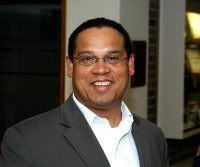 This is a good sign:
This is a good sign:Over the past several months, the Congressional Progressive Caucus has begun formalizing ties to a number of outside groups and organizing internally to bring more pressure to bear on leadership.
“We’ve always been a great group, but in my opinion we’ve not punched above our weight; we’ve punched below,” Rep. Keith Ellison, co-chairman of the CPC, said in an interview last week.
It has seemed at times as though the liberals in the Democratic party were expected to stand in the corner and be quite while the "adults" worked things out. So it's encouraging to see an effort to change this dynamic.
The CPC held its first retreat earlier this year and released a budget proposal in April, which was drafted with the help of the liberal-leaning Economic Policy Institute. The caucus also recently hired a new executive director, Brad Bauman, whom aides describe as an aggressive and press-savvy strategist. Staff to Members within the caucus also are working together more closely, aides said.
The CPC's budget reduced the deficit quicker than the "Ryan Plan" and didn't touch the entitlement programs to do it. Here's Paul Krugman explaining it:
The CPC plan essentially balances the budget through higher taxes and defense cuts, plus some tougher bargaining by Medicare (and a public option to reduce the costs of the Affordable Care Act). The proposed tax hikes would fall mainly on higher incomes, although not just on the top 2%: super-brackets for very high incomes, elimination of deductions, taxation of capital income as ordinary income, and — the part that would be most controversial — raising the cap on payroll taxes.
But because the plan made so much sense and reduced the deficit so much quicker then the "Ryan plan" no one really took it seriously. But it seems as though the administration is at least starting to listen to the CPC, President Obama's recently unveiled deficit reduction proposal mostly involves higher taxes on the wealthy.
Democrats desperately need to push the frame of debate back towards the center, after three years of the Tea Party pushing it hard right and this is a step in the right direction.

No comments:
Post a Comment